- Home
- Academics
- Beyond the Classroom
- Speakers and Events
- Local leaders advise and inspire at Women and Leadership Summit
Local leaders advise and inspire at Women and Leadership Summit
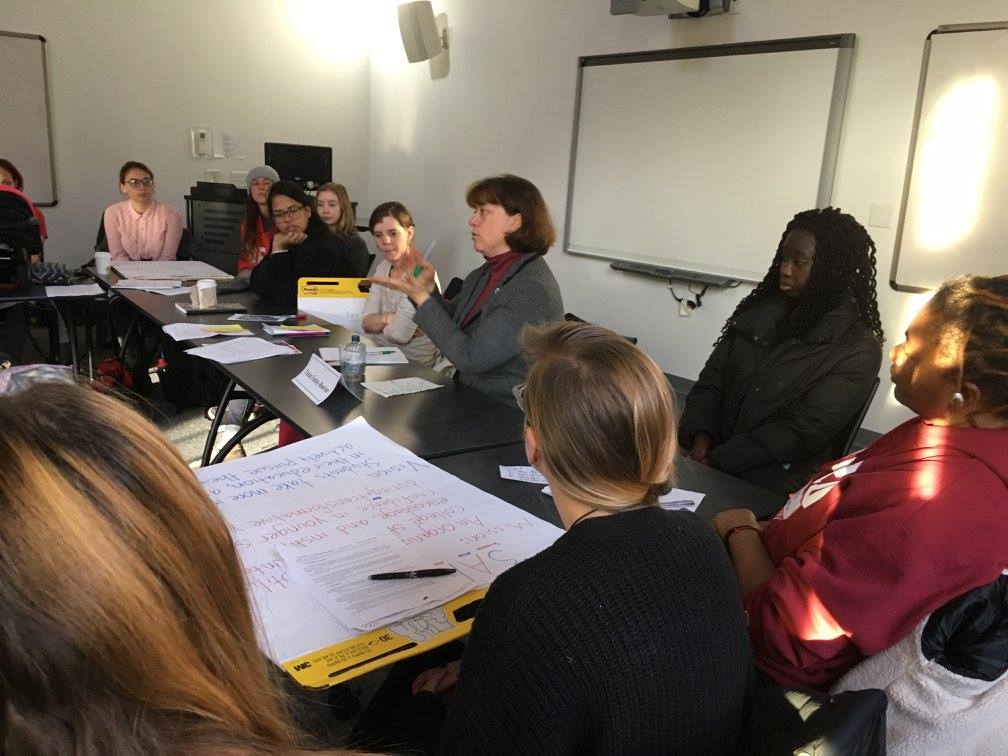 A recent Women and Leadership Summit, held at Bard College at Simon’s Rock, connected
students from Bard College, Bard Microcollege Holyoke, and Simon’s Rock with ground-breaking
women leaders from western Massachusetts.
A recent Women and Leadership Summit, held at Bard College at Simon’s Rock, connected
students from Bard College, Bard Microcollege Holyoke, and Simon’s Rock with ground-breaking
women leaders from western Massachusetts.
The thought-provoking and inspirational day-long program explored urgent questions about women’s role in contemporary politics and everyday life. During the keynote address, discussion panel, and collaborative workshop, speakers shared their experiences, insights, and practical advice with summit participants.
This inaugural event was organized by Jennifer Browdy, associate professor of Comparative Literature at Simon’s Rock; Deirdre d’Albertis, associate dean and professor of English at Bard College; and Mary Anne Myers, program director of Bard Microcollege Holyoke. Jennifer, who organized the International Women’s Day Conference at Simon’s Rock for over a decade, was approached by Dierdre and Mary Anne this past summer with the idea for the summit. The event was a natural fit for Jennifer, who has dedicated much of her career to bringing forth the voices of women of all ages through writing. She has collaborated with several Simon’s Rock students and alumnae as writers and co-editors in her work.
The summit was part of a seminar on Women and Leadership taught by Deirdre at Bard College, which examines current issues in feminism in the United States. The summit offered Simon’s Rock students a chance to earn credit through Active Community Engagement (ACE), a program that is driven by the idea that every individual has the power to affect society and encourages students to become active participants in their communities. For the students of the Microcollege, several of whom are also parents of young children, the summit was an extracurricular event designed to support a strong interest in social justice issues. In order to accommodate the needs of the mothers in attendance, Jennifer hired Simon’s Rock student-workers to provide childcare throughout the day for a group of toddlers, and there was one young baby in attendance for the programming whose presence was pleasantly regarded by all.
Adaptive Leadership
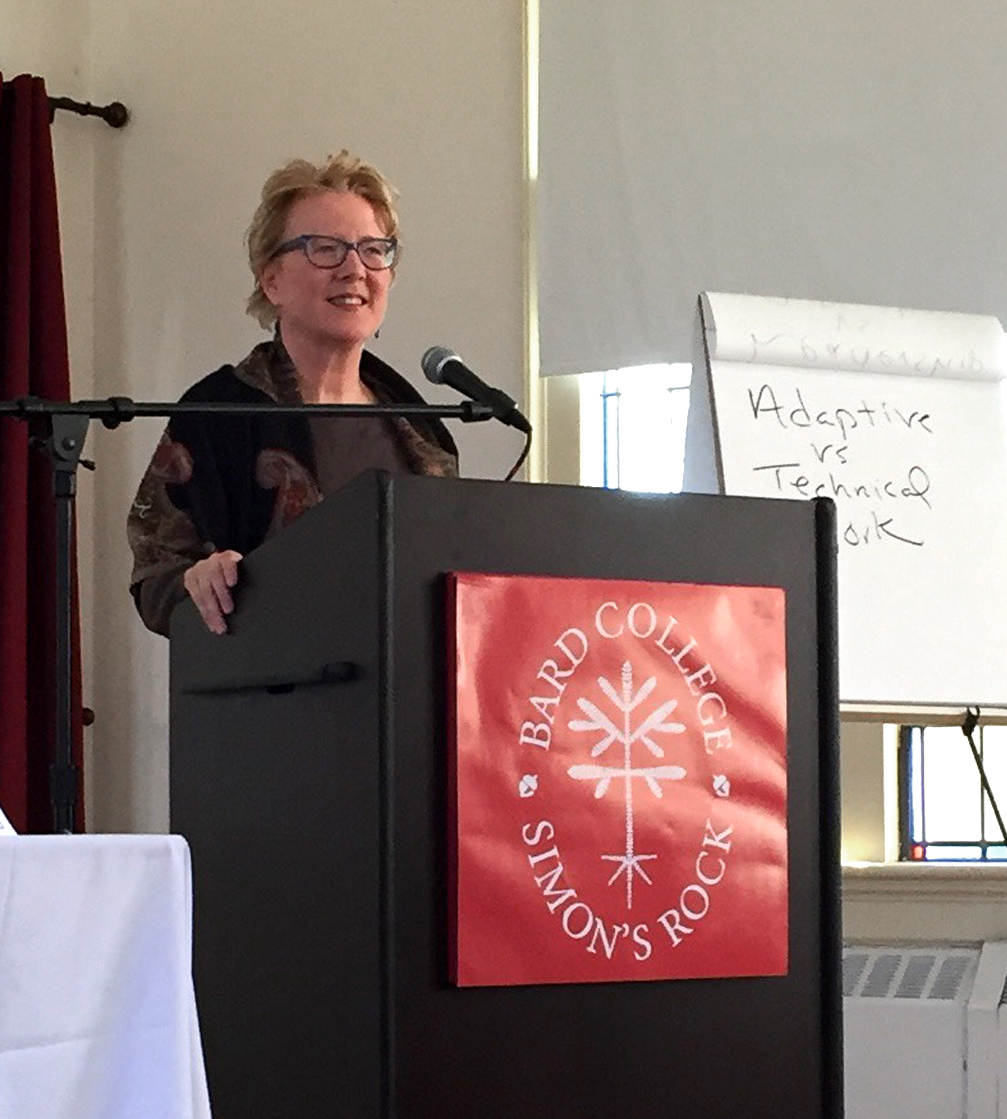 Sarah Chace, PhD,visiting professor at Bard College, opened the summit with a keynote address on Adaptive
Leadership, about which she is currently writing a book. She spoke about some of her
hard-earned life lessons in leadership, from her experience as the first female president
of Harvard’s literary magazine in the 1970s, to her later-in-life explorations of
leadership as part of her graduate studies at Harvard’s Kennedy School. Sarah recently
administered a grant-funded program in adaptive leadership for urban school superintendents
at the Harvard Kennedy School.
Sarah Chace, PhD,visiting professor at Bard College, opened the summit with a keynote address on Adaptive
Leadership, about which she is currently writing a book. She spoke about some of her
hard-earned life lessons in leadership, from her experience as the first female president
of Harvard’s literary magazine in the 1970s, to her later-in-life explorations of
leadership as part of her graduate studies at Harvard’s Kennedy School. Sarah recently
administered a grant-funded program in adaptive leadership for urban school superintendents
at the Harvard Kennedy School.
Sarah described adaptive leadership as the work that occurs when a community faces a problem that has no known or prescribed solution. Adaptive work requires an examination of the values, beliefs, and perceptions that are causing a problem, which then allows for an intervention based on those findings. Effective leadership has a degree of self-sacrifice, and there is a clear distinction between leadership and authority, she said “We look to authority for stability and preservation of norms, whereas leadership is inherently disruptive and interventionist.”
As an illustration of adaptive leadership concepts, Sarah pointed to the #MeToo movement, which has aimed a stark spotlight on issues of sexual harassment and assault in the workplace. “The women who went forth and spoke to these reporters have been exercising leadership, and I would venture to guess there’s a piece of pride and a piece of privacy that is dying in the name of something greater—that’s leadership,” Sarah shared with the audience.
“This is not a technical problem, this is an adaptive challenge, and while there are technical remedies for the problems of a crime being committed, the deeper work lies in shifting a culture that allows such behavior.”
Paths to Leadership
The panel discussion that followed Sarah's keynote provided an opportunity for students to hear from women leaders on questions such as: What was your path to leadership? What are some of the challenges you have faced in positions of leadership? What is some practical advice you would give to aspiring leaders?
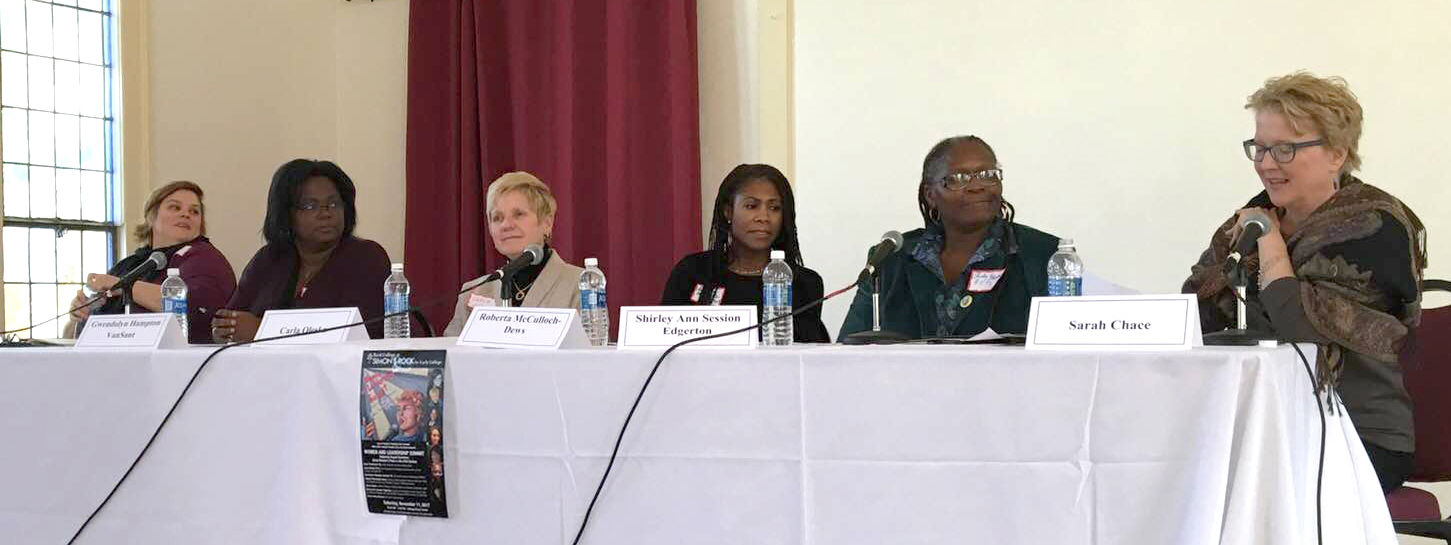
The discussion panel (pictured l-r) Anne Thalheimer, Gwendolyn Hampton VanSant, Carla Oleska, Roberta McCulloch-Dews, Shirley Ann Session Edgerton, and Sarah Chace.
Shirley Ann Session Edgerton, founder of the Women of Color Giving Circle, Youth Alive!, and the Rites of Passage and Empowerment Program (ROPE), traced her journey to leadership back to her childhood church, where she was drawn out of her naturally shy tendencies by a strong community of women leaders and mentors. Years later, after completing graduate studies in education, and with a family of her own, she reflected on the need for that kind of mentorship in her Pittsfield community. In order to address the gap in mentorship and empowerment, Shirley founded ROPE in 2010, a program that helps teen girls grow into successful, independent, and well-educated women. ROPE participants have a 100 percent high school graduation rate and a 90 percent college graduation rate.
Gwendolyn Hampton VanSant, Simon’s Rock alumna and chief executive officer/founder of Multicultural BRIDGE, diverged from commonly held expectations about education in order to attend Simon’s Rock, which she saw as formative in her path to leadership. “I had no idea there were early colleges, but I found Simon’s Rock, and I ended up here at age 15.”
“I think that my first step in leadership was coming up to this strange college in the woods to take hold of my education, and understanding that where I was before wasn’t serving me and who I wanted to be.”
The body of knowledge Gwendolyn acquired at Simon’s Rock has served as the foundation upon which she has built her justice- and diversity-driven nonprofit organization, now in its tenth year. The organization offers educational, advocacy, social service, and empowerment programs for Berkshires residents, as well as training for corporations and human services organizations in Massachusetts, New York, and Vermont.
Challenges of Leadership
Common themes emerged as the panelists addressed obstacles they have faced in their leadership positions, such as trusting one’s own vision and abilities, and learning to prioritize goals. “Just to maintain your vision can be extremely challenging,” offered Shirley. Even with advanced degrees and professional experience, “people will question you because of the color of your skin and your gender. The reality is you can do it. It is not going to be easy. But at the end of the day, you will realize the genius that you are, your talent, and all that you have been given. And you don’t have to wait until you’re 60 years of age to feel that.”
Carla Oleska, PhD, vice president of Institutional Advancement at Elms College, identified imposter syndrome as one of her obstacles. When she first became chief executive officer of the Women’s Fund of Western Massachusetts, she was speaking at an event and recalled having to remind herself that no matter the audience, she had to believe in what she had to share and not to be her own obstacle. At the helm of the Women’s Fund, Carla went on to initiate the Leadership Institute for Political and Public Impact (LIPPI), a nonpartisan initiative that trains women to impact public policy from a citizen perspective, and develops leadership confidence through workshops. “We called the leadership institute LIPPI because when I was a little girl, and I would get a little mouthy, my grandmother would say, ‘Don’t you get lippy with me young lady,’” Carla said, wagging her finger at the audience. “You know what we say to women now in the leadership institute? ‘It is time to get lippy!’”
Anne Thalheimer, PhD, Simon’s Rock alumna, activist, artist, and educator, has been faced with not being taken seriously in the areas of civic engagement and community leadership because of her young appearance or her tattoos. She would often dodge conversations about early college to avoid constantly explaining herself, but eventually she learned to use this inevitable line of questioning as an opening for discussion.
“When I go into a legislator’s office and they look at me like ‘Wait, you have a doctorate?’ I say, not only do I have a doctorate, let me tell you about all the other stuff I do, and — here’s the point I really want to talk to you about.”
Anne is active in local politics, and is currently one of 90 people across the nation to serve as a trained Everytown Survivor Fellow, working with organizations that seek to end gun violence through story-sharing, legislative action, and organizing. In early 2017, Anne collaborated with the mayor of Holyoke and her state representative to establish a statewide proclamation for participation in National Gun Violence Awareness Day, which now occurs every June 2.
When the panel discussion was opened up to audience questions, one participant wanted to know how to balance being a student and an activist. Roberta McCulloch-Dews, director of administrative services in the City of Pittsfield Mayor’s Office and founder of RMDews Media, is also a mother of three and a graduate student. She advised that prioritization and refraining from comparing oneself to others are key, adding: “You want to be an activist, you want to go to work, you want to have a social life, you want to be great in your academic journey. So, put your blinders on, and then keep it moving.”
Workshop: Identifying Common Concerns
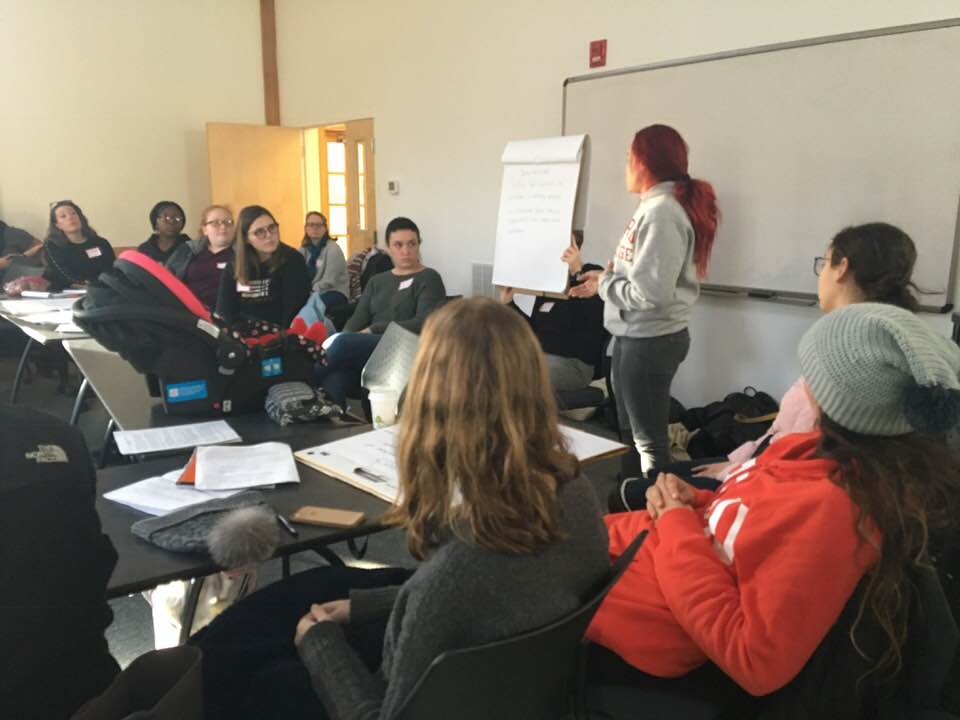 Building on the leadership concepts shared by the speakers, students broke into groups
during lunch for a collaborative workshop, “Identifying Common Concerns,” in which
participants discussed issues that pose adaptive challenges in contemporary society
such as pay equity, health care, education, climate change, gender and equity in the
home, gun control, intimate partner violence, and immigration. Each group focused
on one topic and worked together to draft a mission statement for an organization
that would address the issue.
Building on the leadership concepts shared by the speakers, students broke into groups
during lunch for a collaborative workshop, “Identifying Common Concerns,” in which
participants discussed issues that pose adaptive challenges in contemporary society
such as pay equity, health care, education, climate change, gender and equity in the
home, gun control, intimate partner violence, and immigration. Each group focused
on one topic and worked together to draft a mission statement for an organization
that would address the issue.
When the summit reconvened, the groups introduced their proposed organization and draft mission statement. In total, nine proposals were presented. The organization “InCentive” focused on pay equity in the workplace. It would have a local and regional public presence and be a resource for individuals who have discovered and seek to address pay inequity in their own workplaces. Another proposed organization, “Better State of Mind,” sought to address gun violence as part of a mental health care support network that would strive to shift the association of masculinity with aggression and violence.
Gender Equity in Government Leadership
In closing the summit, Massachusetts State Representative Tricia Farley-Bouvier (D-Pittsfield), informed participants that she wants to see the U.S. government do a better job at representing its people. She described the gap in women’s leadership across the nation. “Women are about 51 percent of the population, and despite steady gains in the last few decades of the 20th century, numbers of women in leadership positions nationwide are stalled—25 to 26 percent is the high watermark. What happens all the time is that we climb and climb, then we hit a ceiling, and we go down. We can’t break this 26 percent.”
Tricia’s motivation to become a leader was driven by her frustration with her local city council, which at the time was all male. She and a group of like-minded women initiated an effort to change the gender ratio on the city council. As the group approached their top nominees, they were met with a common refrain: “That’s a great idea. It can’t be me, but I’m happy to help.”
Tricia ultimately decided to run herself, and was elected—serving on the Pittsfield City Council from 2004 to 2008. She emphasized the importance of having female voices on local boards. “Without representative government, you are not going to get equity.”
Serving as state representative since 2011, Tricia has been a leading voice for women’s issues: supporting initiatives that improve women’s access to reproductive health care, helping strengthen legislation dealing with sexual assault on college campuses, and improving criminal justice reform with regard to women and children. When she was elected in 2011, she was one of six women representing western Massachusetts. Today, however, she is the only woman remaining from that group.
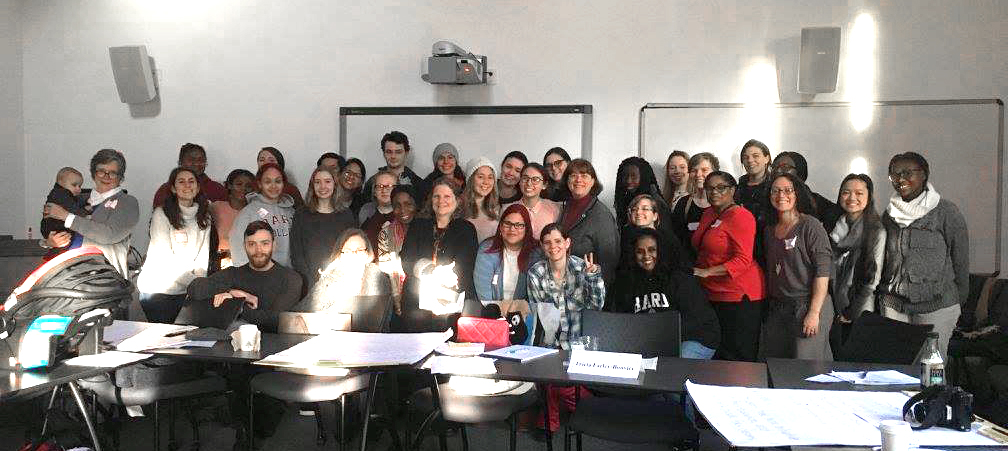 Tricia couldn’t explain exactly why the numbers of women in leadership have stagnated,
but did pose a question to the audience: Why does it take women being asked between
four and seven times to run for elected office, whereas with men, it takes much less?
Addressing everyone at the summit, she said: “Consider this your first ask.” At that,
Simon’s Rock first-year student Ajara Jagne shared that she has already decided to
run for the office of president of the United States.
Tricia couldn’t explain exactly why the numbers of women in leadership have stagnated,
but did pose a question to the audience: Why does it take women being asked between
four and seven times to run for elected office, whereas with men, it takes much less?
Addressing everyone at the summit, she said: “Consider this your first ask.” At that,
Simon’s Rock first-year student Ajara Jagne shared that she has already decided to
run for the office of president of the United States.
A Day of Discovery
As the summit concluded, participants were energized as the room buzzed with conversation. “Leadership often looks daunting; as a young person, it’s easy to put a successful leader on a pedestal and convince yourself that you’ll never get there. The summit did away with those pedestals and that distance.” reflected Jennifer. “This event gave students a chance to hear the stories of how these amazingly impressive women, of a variety of ages and backgrounds, overcame obstacles and stepped fully into their potential as leaders. It was a day of discovering how passion can fuel purpose and make a real difference in the world. We are already thinking about doing it again next year!”